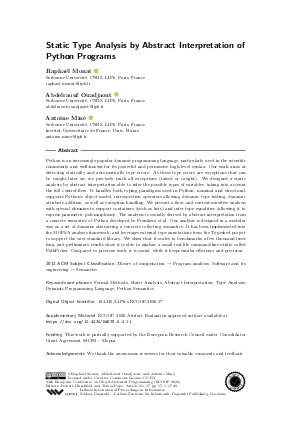@InProceedings{monat_et_al:LIPIcs.ECOOP.2020.17,
author = {Monat, Rapha\"{e}l and Ouadjaout, Abdelraouf and Min\'{e}, Antoine},
title = {{Static Type Analysis by Abstract Interpretation of Python Programs}},
booktitle = {34th European Conference on Object-Oriented Programming (ECOOP 2020)},
pages = {17:1--17:29},
series = {Leibniz International Proceedings in Informatics (LIPIcs)},
ISBN = {978-3-95977-154-2},
ISSN = {1868-8969},
year = {2020},
volume = {166},
editor = {Hirschfeld, Robert and Pape, Tobias},
publisher = {Schloss Dagstuhl -- Leibniz-Zentrum f{\"u}r Informatik},
address = {Dagstuhl, Germany},
URL = {https://drops.dagstuhl.de/entities/document/10.4230/LIPIcs.ECOOP.2020.17},
URN = {urn:nbn:de:0030-drops-131748},
doi = {10.4230/LIPIcs.ECOOP.2020.17},
annote = {Keywords: Formal Methods, Static Analysis, Abstract Interpretation, Type Analysis, Dynamic Programming Language, Python Semantics}
}

 Creative Commons Attribution 3.0 Unported license
Creative Commons Attribution 3.0 Unported license































